This House believes resistance to the Arab Spring is futile
Monday May 30 2011
MOTION PASSED
by 73% to 27%
Transcript
Order of speeches

- Introduction
- Anouar Boukhars
- Jane Kinninmont
- Nadim Houry
- Ahmed Ali al-Mukhaini
- Audience questions
- Vote result
Introduction
 Ladies and gentlemen, a very good evening to you, and welcome to the last in our current series of Doha Debates, coming to you from the Gulf state of Qatar and sponsored by the Qatar Foundation. The old regimes in Egypt and Tunisia may have been swept away, but elsewhere in the Arab world a number of governments are fighting for their survival. Repression, violence and intimidation have been their weapons of choice, but with varying results. Tonight we look at their chances of survival. How effective has brutality been in Yemen, in Syria or in Bahrain? Have those and other governments fought off the challenge to their leadership, or are they fatally wounded from within? Has their reputation been badly damaged, and will the international community ever accept them back into the fold? All questions that lie at the heart of our motion: "This House believes that resistance to the Arab Spring is futile." Our panellists are, as usual, deeply divided. Speaking for the motion, Anouar Boukhars, Professional of International Relations at McDaniel College in the US and a consultant for Jane's Intelligence Review. And with him, Nadim Houry: he's the Human Rights Watch researcher for Syria and Lebanon. A lawyer by training, he's also worked as an investigator for the UN. Speaking against the motion, Jane Kinninmont, Senior Research Fellow at the Royal Institute for International Affairs in London. She has reported widely on the Middle East and North Africa for The Economist magazine. And with her, Ahmed Ali al-Mukhaini: he's Vice Principal of the Said al Shahry Legal Training Center in Oman and strategic consultant for the country's first political think-tank. Ladies and gentlemen, our panel. [Applause] So now let me first of all ask Anouar Boukhars to speak for the motion.
Ladies and gentlemen, a very good evening to you, and welcome to the last in our current series of Doha Debates, coming to you from the Gulf state of Qatar and sponsored by the Qatar Foundation. The old regimes in Egypt and Tunisia may have been swept away, but elsewhere in the Arab world a number of governments are fighting for their survival. Repression, violence and intimidation have been their weapons of choice, but with varying results. Tonight we look at their chances of survival. How effective has brutality been in Yemen, in Syria or in Bahrain? Have those and other governments fought off the challenge to their leadership, or are they fatally wounded from within? Has their reputation been badly damaged, and will the international community ever accept them back into the fold? All questions that lie at the heart of our motion: "This House believes that resistance to the Arab Spring is futile." Our panellists are, as usual, deeply divided. Speaking for the motion, Anouar Boukhars, Professional of International Relations at McDaniel College in the US and a consultant for Jane's Intelligence Review. And with him, Nadim Houry: he's the Human Rights Watch researcher for Syria and Lebanon. A lawyer by training, he's also worked as an investigator for the UN. Speaking against the motion, Jane Kinninmont, Senior Research Fellow at the Royal Institute for International Affairs in London. She has reported widely on the Middle East and North Africa for The Economist magazine. And with her, Ahmed Ali al-Mukhaini: he's Vice Principal of the Said al Shahry Legal Training Center in Oman and strategic consultant for the country's first political think-tank. Ladies and gentlemen, our panel. [Applause] So now let me first of all ask Anouar Boukhars to speak for the motion.
Anouar Boukhars
Speaking for the motion
ANOUAR BOUKHARS
Thanks, Tim. Pleasure to be here. Ladies and gentlemen, the Arab street has finally risen from its anguish. This extraordinary Arab awakening has demolished a myth that Arabs are doomed to be fatalistic losers, that their cultural mindset and political traditions are unsuited to democracy. The sight of millions of pro-democracy protesters from Libya to Yemen to Syria braving tanks and riot squads and the regime thugs in expressing the determination to replicate the historic feats of their counterparts in Tunisia and Egypt has set these preconceptions on fire. Sceptics of Arab democracy see the triumph of pro-democracy forces as unlikely, insecure, as transient. The moment that normalcy returns to the streets of Cairo and other major metropolitan areas in the Arab world, we are told, freedom fever will lose its steam. The battle lines of the future will resemble eerily those of the past. But the reality we are witnessing today in the Arab world is that the orthodoxies of the past do not hold much appeal in a region where youth aspire for a better life, for a life of dignity, development and freedom. Make no mistake about it, this period of historic change in the Arab world will not be short, nor will it be easy, nor will it be without setbacks. There will be ups and downs in the months and years ahead. But the forces of change driven by technology, demographics and youth have been unleashed and there is no going back. With very few exceptions, every society in the Arab world today is feeling the pressure for political change. hatever the outcome in the protracted conflicts in Libya, Syria and Yemen it's almost certain that these countries will look different in the years to come. Those regimes that have chosen to dig in or try to reassert their authoritarian controls will find only temporary reprieve. Experience, theory and history tells us that regimes who have lost their legitimacy cannot survive.
TIM SEBASTIAN
Could you come to a close, please.
ANOUAR BOUKHARS
Sure. And the legitimacy of the Syrian, Libyan and Yemeni dictators is totally spent. So they will be overthrown, if not now, then in the coming years. Thank you.
TIM SEBASTIAN
Anouar Boukhars, thank you very much indeed. You say these countries aren't going to look the same. They could look worse, couldn't they. As you speak, I mean, Arabs may not be doomed to repeat what they've had in the past - they're doomed to die. They're dying in very large numbers, as you know, around the region. That's not a good sign, is it.ANOUAR BOUKHARS
Sure, that's fair. I mean, again, the..
TIM SEBASTIAN
"It's fair." Well, how do you mean it's fair?
ANOUAR BOUKHARS
Well, the expectation is that the Syrian regime's reaction and the Libyan regime's is no different from other reactions in other..
TIM SEBASTIAN
But there's no sign that the Libyan or Syrian regimes... The Syrian regime, at least, is cracking. I mean, where are the massive defections from the government, where are the massive defections from the army? You're not seeing them, are you?
ANOUAR BOUKHARS
History tells us that - remember, the Syrian regime legitimacy is totally spent, right. Given that the legitimacy is withered away, as I said, it's only a matter of time before they are swept away.
TIM SEBASTIAN
But history also shows you that if you have the levers of power in your hands, like the army and the security services, you're not going to lose.
ANOUAR BOUKHARS
I'll take you back to Nicaragua in the 1970s, when..
TIM SEBASTIAN
Well, let's stay with this region. Let's stay with this region.
ANOUAR BOUKHARS
That's fine. But history tells us. Remember, the Nicaragua leader used force in 1975. He crushed the revolt. Four years later he was swept away. The same thing we can expect in Syria. For now the elite guard is staying with the regime, right, but we don't know where's the stance of the army. Remember, the army in Syria is made up of conscripts.
TIM SEBASTIAN
Yeah, but our motion is "Resistance is futile", and the resistance seems to be killing a lot of people at the moment and keeping the status quo exactly where it is.
ANOUAR BOUKHARS
As sad as it is, you're absolutely right, I mean, it's naïve of us to think that change will be easy, that change will not go through tribulations and through hardship. But as I say, in the mid-term, in the next few years, there will be change, and we need to take it seriously.
TIM SEBASTIAN
Wishful thinking on your part?
ANOUAR BOUKHARS
I mean, again, the empirical evidence demonstrates that it's not!
TIM SEBASTIAN
Ah, okay. Anouar Boukhars, thank you very much indeed. Now let me ask Jane Kinninmont, please, to speak against the motion.
Jane Kinninmont
Speaking against the motion
JANE KINNINMONT
My colleague and I would like to make it very clear from the outset that we support people's rights. We do not support repression. But in addressing this motion we think that we need to be realistic. Democracy for the Arab region is possible and I believe it is desirable. But it is not inevitable, at least not in the foreseeable future. It would be wonderful if we could see united, popular movement peacefully persuading rulers to say yes to reforms and to embark on real, meaningful democratic transitions. But what we're already seeing in most countries in the region is looking very different. There already is, and there will be further, intense resistance from governments, who have many tools to draw on. Other groups too will be resistant to change, including members of ruling parties, business elites who are gaining from the status quo, sometimes foreign powers and anyone who feels that they will be losers from democracy. In Egypt and Tunisia a key factor was not only the unprecedented solidarity of the opposition but also the solidarity between the army on the streets and the people on the streets. Rulers were not able in those situations to really go through with the use of brute force. But force can work. It's interesting that we see more Arab countries today recruiting for their security forces overseas. Brute force can be particularly effective if it's combined with divisions in society - ideological, tribal, ethnic or religious. We are seeing those divisions being exploited, particularly in Syria, Libya and in Bahrain. We saw this also in Iraq in 1991, where Saddam Hussein did manage to buy himself another twelve years in power. There will be a huge amount of propaganda and disinformation designed to exploit those decisions. But there is a difference between the short term and the long term. From a ruler's point of view, a few more years in power may seem worth it, but the national interest of these countries will be better served by allowing peaceful reform and trying to build a consensus behind it in society. Thank you.
TIM SEBASTIAN
Jane Kinninmont, thank you very much indeed. Isn't the biggest thing in the favour of these revolutions that the attitude of the West has changed, the attitude of the international community has changed - no longer will they support or turn a blind eye to dictatorships as they did with Mubarak, as they did with Ben Ali in Tunisia? It's not going to happen. That's a big boost to the revolutionaries, isn't it?
JANE KINNINMONT
I'm not sure we're suddenly seeing a new consistent pro-democracy policy emerging from the West.
TIM SEBASTIAN
Well, we're seeing things that have been said which haven't been said before. Obama's message to Assad: "Be part of the change or get out of the way." You know, William Hague saying to Bahrain and other countries, deeply concerned by the unacceptable violence: "Unacceptable violence... Governments must respond to legitimate aspirations of their people." We haven't seen that in a while from the West - not in this region.JANE KINNINMONT
Statements are important, but in the case of Bahrain it is really words rather than actions. Syria's rather different. But Syria's..
TIM SEBASTIAN
Okay, well, I should have said cancelled some military contracts already with Bahrain.
JANE KINNINMONT
True, but that's really UK legislation kicking in. There are restrictions on arms exports. I think for the most part that alliance remains very strong. Syria has always had a problematic relationship with the West.
TIM SEBASTIAN
Yeah, well, they were finessed in the past, but they're not going to be finessed now, are they. So this is a big thing for the revolutionaries, isn't it? If the attitude of the West has really changed, if it's been shown to change, this is what could swing it their way, isn't it?
JANE KINNINMONT
I think it was important in Egypt. I'm not sure that policy towards the Gulf has changed very much.
TIM SEBASTIAN
Okay. Jane Kinninmont, thank you very much indeed. Now could I please ask Nadim Houry to speak for the motion.
Nadim Houry
Speaking for the motion
NADIM HOURY
Sure. Look, no one likes to give up power on their own and definitely not dictators in this region, who have gotten used to sit at the throne for more than thirty or in some cases forty years. They're not going to give in without a fight. That is a fact. But what is going on here? What are the forces behind the Arab Spring? First, the wall of fear is falling down in the region. The wall of fear that has kept people from challenging authority, that has kept people from questioning their dictators - we're seeing those cracks in countries like Syria, where a few months ago it would have been impossible and people in cafés in Damascus would whisper. Two, what we're seeing is a collective yearning from deep down for things like freedom, social justice and a more representational form of government. And finally what we're seeing, again, a very powerful force that my colleague talked about is a coming of age of a younger generation - people like you in the audience, who represent a big demographic bulge in our societies and who got tired of being marginalized. Now, what do you have in front of that powerful mix? You have dictators who've been around for thirty, forty years. Yes, in some countries they still have the loyalty of their troops, but that's it. They are in free-fall. They have already lost legitimacy. You know, President Assad can no longer go shop in Paris. They have already lost a lot of their internal support. Their violent crackdown is destroying their economy and soon they will find it hard to pay those salaries of those soldiers and security forces that they need to keep on their side. Frankly, they are relying on some countries in the region, like Saudi Arabia and others, who seem to be bankrolling the counter-revolution. But that's not going to help all countries the same way. The train has left the station. Of course it's going to take time. Yes, we all got used to Twitter, we all got used to sort of instant change; but you can't change countries that have been in the icebox for thirty, forty years in a week, in two months or in three months.
TIM SEBASTIAN
Could you come to a close, please?
NADIM HOURY
Sure. And just because these uprisings are encountering some form of resistance - resistance that was expected - let's not minimise the dynamic nature of these movements, the courage of the protesters and the wind behind their sail. Because I am convinced that they will succeed.
TIM SEBASTIAN
Nadim Houry, thank you very much indeed. You say that some of these governments that are pushing back and resisting still have the loyalty of their troops but that's it. That's everything, isn't it?
NADIM HOURY
No.
TIM SEBASTIAN
As far as staying in power is concerned?
NADIM HOURY
No, because the troops..
TIM SEBASTIAN
They don't need the loyalty of their people, because they were never elected anyway. They don't need the buy-in from the people, do they?
NADIM HOURY
Yeah, but you cannot run an economy when you've got your soldiers in the streets of your cities. You cannot create jobs for that new demographic that you want to keep on your side if you don't get investment. And who's going to invest today?TIM SEBASTIAN
And isn't that the problem in Egypt? You know, they may have had their revolution, but what's changed? They're ruled by a military junta.
NADIM HOURY
Yeah, well, not yet. I think let's wait to see the elections. And, you know, we're seeing the international community jumping in to help.
TIM SEBASTIAN
But that's speculation. What they've got at the moment.
NADIM HOURY
No. Look at what the G8 just promised last week. I mean, they are going to shower Egypt and Tunisia with money. This is the sort of carrot approach.
TIM SEBASTIAN
If, if it moves in the direction that they hope it will move. There are big ifs attached here.
NADIM HOURY
Right. Look, of course there are big ifs.
TIM SEBASTIAN
There's a price tag to all this aid, isn't there? There's a price tag.
NADIM HOURY
There has never been a change without risk. But frankly, you know, the opposite side tells you about realism. What has realism given this region? What has it given us? It's given us forty years of rotten politics, of rotten economies. We can't export anything. We're not exporting ideas, we're not exporting goods except petrol, that we're running out of. We're not producing anything. All in the name of realism.
TIM SEBASTIAN
But you're saying that people are going to continue to come up and confront the army and the security services and get mown down. There is no shortage of people who are going to do that. Well, comes a point when people say, "Okay, enough people have died. It's not going to happen."
NADIM HOURY
It's a battle of the wills. It's a battle of the wills. And I'll concede you that. But what I've seen so far is that the protesters have been more courageous, have been more patient, than the actual armed forces. Tunisia and Egypt were relatively easy, I'll concede that. But look at Yemen and Syria, right - very complicated countries. But who's got the momentum? In Syria more than a thousand people have been killed and yet they continue to demonstrate.
TIM SEBASTIAN
And look at the monarchies of the regions: circling the wagons, creating their own assistance program, their own group of guardians. Who's going to knock that off? Who's going to unseat them?
NADIM HOURY
Sure. Right. Well, the same people who have unseated... Look, I think first of all let's be...
TIM SEBASTIAN
You're asking a lot.
NADIM HOURY
No, I'm not asking a lot.
TIM SEBASTIAN
I mean, you've got Saudi Arabia, you've got Bahrain, you've got Qatar, you've got the UAE - they're all pledged to help each other in times of need.
NADIM HOURY
Right. Well, we'll have to see. The Arab Spring...
TIM SEBASTIAN
Who's going to unseat them?
NADIM HOURY
The Arab Spring does not mean unseating every single dictator, right? It's a menu of change. It can vary from, you know, getting rid of a dictator. It may mean a regime change from an existing regime - we're seeing that in Jordan, we're seeing that in Morocco, and we may see an effort by some of the countries to buy off the loyalty of its citizens.TIM SEBASTIAN
Okay, but we haven't seen anything yet that can't be rolled back, have we?
NADIM HOURY
Well, of course we've seen a lot that can be rolled back. I mean, let's not minimise that today Mubarak is in jail. Okay, the pharaoh of Egypt is in jail.
TIM SEBASTIAN
And his army is still in power. We have to move on. Nadim Houry, thank you very much indeed.
NADIM HOURY
No problem. And his army is responding: his army is meeting with a Google executive who is thirty years old! Let's not minimise the power of demographics. The youth have imposed - you know, Tantawi is sitting with thirty-year-olds to discuss with them the future of Egypt, in three months.
TIM SEBASTIAN
Okay, I'd love to do the same myself! [Laughter] Thank you very much indeed. All right. Could I please ask Ahmed Ali al-Mukhaini to speak against the motion, please.
Ahmed Ali al-Mukhaini
Speaking against the motion
AHMED ALI AL-MUKHAINI
Thank you, Tim. And ladies and gentlemen, I thank the honourable gentlemen on the other side of the House for paving the way for our argument. We, my colleague and I, do believe that this is not a call for repression; it's a call for realistic reading on the ground. And we should not lump all the Arab countries together. Each country has to be treated differently. But we do believe that government resistance to the Arab Spring is not futile - it will bear fruit. Because of four reasons: Socially we do not have social structures that will absorb and build up the momentum in order to achieve the critical mass to effect change. And all the demands have been portrayed either as the demands of the ungrateful or foreign collaborators - and both of them have driven people away and discouraged the wagon to be actually joined. Economically - my colleague talked about economics - economically the GCC countries will fund all the resistance in the Arab world. They will not allow role models to exist. And they will be able to give more hand-outs or offer more jobs. Thirdly, they can make everything lawful. They can make laws, they can amend laws, they can actually manipulate the judiciary, and will make everything lawful. So they have the tools and they would know how to deal with it. And finally, politically we are dealing with animals that are very much endangered and they would use their survival instinct. They will be merciless. They will devour everything in front of them. There will be no time for values. And if you want to see more bloodshed, then that's what you're going to see. And if I may end my introduction here: let's not rely on the European Union or the States, or any external forces. They are manipulated, they have been, they will be. Thank you.
TIM SEBASTIAN
Ahmed Ali al-Mukhaini, thank you very much indeed. If they're in such a delicate, parlous state as you say, they may well fall apart internally. This is the land of coups and unhappy families, isn't it? This is the region for it.
AHMED ALI AL-MUKHAINI
Well, I don't think they will fall apart, because they made sure that they have this nervous system going around each other.
TIM SEBASTIAN
They've fallen apart in the past.
AHMED ALI AL-MUKHAINI
No, they haven't.TIM SEBASTIAN
They've fallen apart in the past. They don't have normal transitions of power, do they? They have coups.
AHMED ALI AL-MUKHAINI
They have been resilient. They have been resilient. Whatever coups they've had..
TIM SEBASTIAN
They have fights, they have feuds, they have internal disagreements left, right and centre.
AHMED ALI AL-MUKHAINI
Money speaks, Tim, money speaks. They can buy everybody. They will buy everybody. And all the misery you see will be bought out in time.
TIM SEBASTIAN
They're not buying the people who keep coming onto the streets time and time again.
AHMED ALI AL-MUKHAINI
Well, you see, for the time..
TIM SEBASTIAN
As one of those on this side has said, the thing that's changed is fear. And when there is no longer any fear among people, what levers do the dictators have? What levers do they have?
AHMED ALI AL-MUKHAINI
We have several examples.
TIM SEBASTIAN
When people don't want their money and they're not afraid of them, what levers do they have?
AHMED ALI AL-MUKHAINI
Okay, no, we have several examples. People will be defied, people will be kept in their homes. They will be arrested, they will prosecute them.
TIM SEBASTIAN
But they did that in Egypt and they did it in Tunisia.
AHMED ALI AL-MUKHAINI
Oh, Egypt is a different case.
TIM SEBASTIAN
It is?
AHMED ALI AL-MUKHAINI
Egypt is a different case. But, you see, Egypt...
TIM SEBASTIAN
And you think that people in the Gulf are going to accept what the people in Egypt and Tunisia have overthrown?
AHMED ALI AL-MUKHAINI
Well, you have to remember one thing, Tim: Egypt and Tunisia were taken by surprise. These people in the Gulf here, they have done their homework and they are going to make sure that none of the other countries would fall to allow for their failure.
TIM SEBASTIAN
It's a last-ditch move. It's a desperate move, isn't it?
AHMED ALI AL-MUKHAINI
It is. But they will make it.
TIM SEBASTIAN
And that won't last very long. They know the game's up, don't they?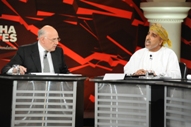 AHMED ALI AL-MUKHAINI
AHMED ALI AL-MUKHAINI
Well, we know it is for the time being. The argument is for the time being, and for the time being they will succeed.
TIM SEBASTIAN
But they know the game is up already, don't they?
AHMED ALI AL-MUKHAINI
Well, they have all the rules.
TIM SEBASTIAN
Otherwise they wouldn't be so nervous, so insecure.
AHMED ALI AL-MUKHAINI
They are changing the rules. They can change the rules again. They can do all these things.
TIM SEBASTIAN
And you think that people will accept it?
AHMED ALI AL-MUKHAINI
The people, you know, you can actually mobilise them, but if you do not have structures to really amass that mobilisation you will not bear fruit. It will be just, you know, riff-raff waving flags in front of the government - that's it.
TIM SEBASTIAN
Ahmed Ali Al-Mukhaini, thank you very much indeed.
AHMED ALI AL-MUKHAINI
Pleasure.
Audience questions
TIM SEBASTIAN
All right, we're going to take your questions now on the motion, "This House believes resistance to the Arab Spring is futile". A gentleman in the second row there, in the red. We'll get a microphone to you, if you'd stand up. And if you'll tell us where you're from, please.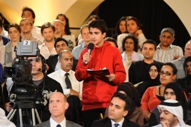 AUDIENCE (M)
AUDIENCE (M)
I'm Syrian. In the past regimes, the governments used to kill their citizens brutally without anyone knowing the massacres across the years. People around the world now know the truth behind their own governments. Every person with a mobile phone is now a reporter, a reporter to truth to the world - just like the situation in Syria. People worldwide are now aware of the situation. The human activists are now ready to fight for the people there.
TIM SEBASTIAN
Okay, so you're coming to a question?
AUDIENCE (M)
People are now protesting because truth is now unveiled. No one can stop them, because now governments will think twice before they act anything, because whatever they will do it will be shown in future.
TIM SEBASTIAN
Okay, Jane Kinninmont, do you want to react to that?
JANE KINNINMONT
I agree it's very important. It's very hard now for governments to cover up crimes. But there is a huge battle of information, of propaganda, in the traditional and in the social media. There are pro-regime Syrians going around the world telling people that everything you see has been faked by activists or is a conspiracy by foreign satellite channels that we could name. So it's not clear yet who is winning that battle for ideas. And I think, again, in that space there's going to be very, very fierce resistance.
NADIM HOURY
But let's be honest here. Who is believing Syrian state TV? I dare anyone in this room to watch Syrian state TV for one hour without cringing. No one is. You know, when they actually - they don't even..
TIM SEBASTIAN
Why don't we ask them. Why don't we ask them? You've posed a question. Does anybody here believe Syrian state TV?
NADIM HOURY
Well, first of all, who would actually watch Syrian state TV? [Laughter]
AUDIENCE (M)
No one. No one.
TIM SEBASTIAN
That might be a better question!
NADIM HOURY
Well, thank you very much - they've just made my point.
TIM SEBASTIAN
Let me go back to the questioner here. Because your claim is that whoever controls the social media is going to control power in the end?
AUDIENCE (M)
Yes. What I'm saying is that if you have a mobile phone and you can press a button that would send it to another country which show the truth, this is a deathening [sic] tool to the regime. Because you're showing the truth.
TIM SEBASTIAN
So in the end the regimes, you're saying, can't resist this?
AUDIENCE (M)
Yes.
AHMED ALI AL-MUKHAINI
But, you see, you can mobilise people, but if these people do not fall into organised movement, you know, it's just a futile exercise. I mean, they will come, they'll put it in motion, you know, we'll feel happy about what they've done - but eventually that's it.
TIM SEBASTIAN
Tahrir Square wasn't a futile exercise, was it?
AHMED ALI AL-MUKHAINI
What, sorry?
TIM SEBASTIAN
Tahrir Square in Cairo was not a futile exercise, was it?
AHMED ALI AL-MUKHAINI
Well, do you know how many times they actually mobilised people in that month alone? There were two thousand attempts, two thousand attempts in Egypt alone that month, to actually have a revolution. And they were crushed over and over again, until they managed to accept the truth.
TIM SEBASTIAN
And they keep coming back. And they keep coming back everywhere.
ANOUAR BOUKHARS
You're absolutely right. I mean, there is no denial that an Arab public sphere has emerged that is based on this blend of, you know, internet and at the same time also print technologies and that within that public sphere Arabs have discovered their political voice. So that's where the strength, I think, of these technologies in addition to other elements. Because this is not a Twitter...
AHMED ALI AL-MUKHAINI
It will take time! Very long time. People have suffered political starvation for forty years. Decades of political starvation. And you expect them...
TIM SEBASTIAN
Doesn't mean they haven't been thinking does it?
AHMED ALI AL-MUKHAINI
That's a different story. People can think. They can dream. Daydreaming is a very..
TIM SEBASTIAN
They're doing more than that in Egypt and Tunisia and Syria and Yemen and Bahrain. They're doing more than thinking.
AHMED ALI AL-MUKHAINI
Daydreaming has been proven to be the main cause for depression. Daydreaming is the main cause for depression.
NADIM HOURY
Well, look, I'm sorry, let me just jump in here.
TIM SEBASTIAN
Okay, just one more point, and then I'm going to move on, because there are lots of questions.
NADIM HOURY
Okay. Yeah, just I wanted to clarify something. So what the other side would have you believe is, because there are no existing structures, no well-established political parties, transitions cannot happen. Well, you know what that sounds like? Like the argument the regimes are painting: "Well, there are no alternatives. It's only us - it's Mubarak or chaos. It's Assad or chaos." Well, that's not true. Who's to blame for not having a political party?
AHMED ALI AL-MUKHAINI
[Inaudible]
NADIM HOURY
No, who's to blame for not having a political party? If they want the structure, everyone would be in jail and there would have been no uprising. Yes, it is a challenge. No one is underestimating the difficulty of the transition. Again, you are getting something out of the icebox and sticking it in a microwave after forty years.
AHMED ALI AL-MUKHAINI
We're talking about the time being.
TIM SEBASTIAN
Okay, let him come back on this.
AHMED ALI AL-MUKHAINI
We're talking about the time being. The time being, any resistance will not be futile; it will succeed. If you talk about ten years from now, perhaps - different generation, different people, different interests. But..
TIM SEBASTIAN
Okay, we're going to move on. There's a gentleman in the fourth row there. You, sir, if you'd stand up.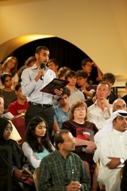 AUDIENCE (M)
AUDIENCE (M)
I'm from Yemen. Mr. Houry, you have said that this Arab Spring includes overthrowing dictators, regime change and so on. But in fact the Spring has taken a different swing and does not adapt to the prospective systems only taken one way, which is overthrowing dictators. Each revolution now has followed the same procedure that is taken in Egypt and Tunisia and it has been proven that it's not effective as we can see nowadays in Syria and Yemen. What is your comment regarding just following one Spring one way, even though we all want to find the revolution that adapts this prospective country? But if we ask anybody in this revolution, you know, square: you ask them, "What are you doing, what are you here for?" they say, "Overthrowing my president." And then what happens afterwards?
TIM SEBASTIAN
Okay, all right. Nadim Houry, come in there, please.
NADIM HOURY
Sure. No, actually I don't agree with your characterisation. Yes, there's the Egypt and Tunisia model, but there's also the Morocco, Jordan model, where, you know, suddenly we saw concessions that were offered. There's the Oman model as well where, you know, it's taking time but suddenly reforms are being accelerated. And let's go back to Syria, because this is one country that I know very well. It did not start along those models. I mean, the demands of people in the streets in Syria at the beginning were for gradual change, for reforms that President Assad had been promising for eleven years and had failed to deliver. It's the only one...
TIM SEBASTIAN
A popular president.
NADIM HOURY
Sorry?
TIM SEBASTIAN
A popular president.
NADIM HOURY
Initially a very popular president. But when the demands started escalating, when those promises were actually materialising on the streets by bullets by the security forces and the army. And yes, when you shoot at people their demands are going to increase. So, you know, I'm not going to fault the Syrian protesters or the Yemeni protesters, who have been incredibly patient with the violence of their regime. Initially they all wanted... You know, those presidents or those kings could be a Juan Carlos of Spain, but they chose to be a Ceauşescu of Romania. And if they keep going down that route, unfortunately they're going to end up like Ceauşescu. So better take the Ben Ali route and go and spend your retirement in Saudi Arabia.
TIM SEBASTIAN
Okay, Jane Kinninmont, do you want to come in on it?
JANE KINNINMONT
I think we haven't seen everybody calling for the outright overthrow of existing systems. In Bahrain and in Oman the vast majority of protesters have been calling for reforms under the monarchy, for constitutional monarchy. In Bahrain a minority called for the overthrow of the regime. I'd like to come back on what you're saying. I don't think we are trying to say that it's only autocracy or chaos; I think there's a huge menu of different options for constitutional monarchy, for democracy with, there's so many different models, even in Europe. This region will find its own variety of models. But what the Bahrain case does show you that's interesting is that the government has been quite successful in portraying the uprising internally as being an Islamist revolutionary movement, by taking the most extreme voices and pretending that they are representative of the whole. And in Bahrain you're seeing more people turning state TV back on and deciding that the international media is all hugely biased and only State media tells them what they want to hear, and they're watching it again.
TIM SEBASTIAN
Okay, I'm going to take a question up there, a lady at the back. Yes. If you could stand up, we'll get a microphone to you.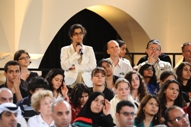 AUDIENCE (F)
AUDIENCE (F)
The opposition has claimed repeatedly that they are pro-democracy. But isn't that what the Arab Spring is all about? The Arab Spring is a movement for democracy and for reform. So how is it futile, how is resistance to the Arab Spring futile? You said so yourself that, yes, in the Egyptian case there were several protests and they were crushed, but they succeeded in the end. So how is it futile exactly?
AHMED ALI AL-MUKHAINI
Well, it's futile because of many reasons. I mean, the discussion we have had is that it is futile in the time being. You will not see immediate results. In Egypt, for example, it's been going on for years and years. On average three hundred to five hundred protests or attempts to do a coup against the regime every month. And in that month when it happened, there were about two thousand going on. So it will take time. It's wishful thinking. We do not say it's not going to happen; it's going to happen. Do not believe that just by going to the street you will make change. You need strategy. And if I may go back to the issue of Yemen and people deporting their leaders: to my surprise, most of these people were just borne on the moment. They did not have strategies. They do not have strategies. And they think if you have a strategy and you have people who are organised, you can't be targeted and you can't be eliminated. But they have to take that risk if they want to succeed.
JANE KINNINMONT
We're not saying that the Arab Spring is futile. We're not saying that democracy movements are doomed to failure. What we're saying is that the forces of resistance are very strongly are forces to be reckoned with. The struggle is going to be long and hard.
AHMED ALI AL-MUKHAINI
Yes.
TIM SEBASTIAN
And you're betting on the forces of resistance winning out, at least in the short and medium term?
JANE KINNINMONT
At least in the short term in some countries. I would distinguish between, for instance, Yemen, where I do think that Saleh's attempts to hold onto power are now futile. I think his days are numbered and the situation in Bahrain, where unfortunately I think they are in a worse position.
TIM SEBASTIAN
You think their days are numbered?
JANE KINNINMONT
No. This is what I'm saying. I think that Saleh's days are numbered. I think if you look at the situation in Bahrain, the democracy movement has been set back more than a decade by the recent events.
NADIM HOURY
Well, it's very... Sorry, go ahead.
ANOUAR BOUKHARS
I mean, protests are going to follow different trajectories in different places. I mean, in Libya and Yemen it's fair to say that the regimes are done. In Syria the outcome is going to depend, obviously, on endurance. I mean, how long can the protesters sustain it?
TIM SEBASTIAN
But answer Jane Kinninmont's point about Bahrain, will you?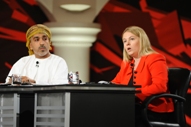 ANOUAR BOUKHARS
ANOUAR BOUKHARS
Look, that's right. But the same thing can be said about the regime. How long can the regime maintain its security forces mobilised in a war mode? For how long can you go? For how long can they sustain the cohesiveness of the regime?
AHMED ALI AL-MUKHAINI
How long Egypt has been under emergency law?
ANOUAR BOUKHARS
I'm sorry?
AHMED ALI AL-MUKHAINI
How long Egypt has been under emergency law? Thirty-five years or something like this? They can't continue.
ANOUAR BOUKHARS
That's right, but these are different contexts. These are different contexts. People have seen what people power can accomplish. And the same thing is going to happen in Bahrain. I mean, you cannot continue repressing 70 percent of your population. So, if you want to make a forecast of what's going to happen in the near term, it's either - very unfortunate - it's either there's going to be a resistance, right. When the street protests don't work, we're moving to different kinds of resistance.
TIM SEBASTIAN
Why can't you go on repressing 70 percent of your population? If you have the power in your hands, you can go on doing it indefinitely.
ANOUAR BOUKHARS
That's when the power of street protest is fundamentally changed into violent resistance.
TIM SEBASTIAN
You're not saying that, Jane Kinninmont, are you?
ANOUAR BOUKHARS
So that's where we are going into Bahrain.
NADIM HOURY
I also want to say - I mean, sorry - just on Bahrain.
TIM SEBASTIAN
Can we just get her to answer that and then come back on it.
JANE KINNINMONT
I think you're right. I think having failed to be able to achieve things through the very weak parliament that hardly functions, I think that there are going to be more people turning to violent resistance in Bahrain. But ultimately they're not really armed. It's going to be an unpleasant thing, it's going to be an irritant, but I don't think that resorting to violence is actually going to be successful there either.
TIM SEBASTIAN
Nadim Houry, you wanted to make a point there.
NADIM HOURY
Yeah. I mean, we're talking about the Bahrain model, which seems to be now the model of the so-called "resistance" to the Arab Spring. First of all, the resolution is that it's futile. I mean, it takes time. The apartheid regime in South Africa, it took time to bring it down, but it was clear that history was blowing the other way. And it will be the same in Bahrain. You know, if Bahrain was so normal, if it managed to turn the corner, how come it still has to rely on GCC and Saudi troops to keep the peace? You know, we all saw those ads of Bahrain: Business-Friendly.
TIM SEBASTIAN
South Africa was in a very difficult position, wasn't it?
NADIM HOURY
Well, and Bahrain will be the same.
TIM SEBASTIAN
It was on its own. It was on its own.
NADIM HOURY
Yeah.
TIM SEBASTIAN
Bahrain is, apparently, surrounded by friends.
NADIM HOURY
Well, surrounded by friends with a lot of money, that's true. But you can't rule against 70 percent of your people today for very, very long. You know, little things - little things will start... I mean, let's take the example. Bahrain spent millions and millions of dollars on a campaign called Bahrain: Business-Friendly. I'm sure you've all seen those ads. What has that gotten them today? Their reputation is in tatters. No one will go and invest there. So yes, their wealthy friends are going to spend money. And maybe in Bahrain, because it's a small population with a lot of money, they're going to be able to buy some time, more than some other countries. But it is futile. Maybe in Bahrain they can buy five years or ten years. In Syria maybe they will be able to buy one year.
AHMED ALI AL-MUKHAINI
But isn't that the whole argument?
NADIM HOURY
But that just means it might take a year, but I think it's very important. Because they're conceding: "Well, it's going to be hard in the short term." Of course it's going to be hard in the short term.
TIM SEBASTIAN
Ahmed al-Mukhaini.
AHMED ALI AL-MUKHAINI
Then the whole argument is time? You know, you have been going on and on and on about time. We do not disagree on the time, but we are talking about now, immediate and short term, mid term. You know, these powers will curb the momentum. If you curb the momentum, you have curbed the Arab Spring.
TIM SEBASTIAN
Okay.
ANOUAR BOUKHARS
I mean, if you think the transitions towards democracy are going to quickly materialise, you will be disappointed. You're talking here about, "Well, it might happen in ten years." Well, if it did happen in ten years that's not too bad. I mean, look...
TIM SEBASTIAN
He's not going to be disappointed - he's arguing the other way.
ANOUAR BOUKHARS
No, that's fine. That's exactly what he said. No, what he said is that there might be a change in ten years, and this is exactly what we argue, where like revolutions take time. What we are seeing is just the beginning of a long process. I mean, even in peaceful revolutions, like in Egypt and Tunisia, it's going to take at least half a decade, right, for a change to come.
TIM SEBASTIAN
Okay, I'm going to move on. The questioner at the back. If you'd stand up, we'll get a microphone to you, please.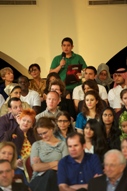 AUDIENCE (M)
AUDIENCE (M)
Well, just to start up, I'd like you to say Tunisia and then Egypt. Because...
TIM SEBASTIAN
Where are you from, please?
AUDIENCE (M)
Well, I'm from Tunisia - Tunisian school! [Laughter, applause]
TIM SEBASTIAN
There's a surprise.
AUDIENCE (M)
I would like to start with Tunisia, because Tunisia started the revolution. And Mrs. Jane said that there are peaceful ways to do these revolutions, but there won't if the dictators are not willing to give up their chairs. So...
TIM SEBASTIAN
What point do you want to make? Do you agree?
AUDIENCE (M)
No, there are no - oh my God! [Laughter] There are no peaceful ways to do that. Well, you said there are, so what are they?
JANE KINNINMONT
No, I agree with you. I think peaceful protest doesn't always work everywhere. There are some very positive examples of peaceful protests, but in Tunisia and in Egypt that succeeded ultimately because the rulers don't seem to have had the capacity to really use their armed forces to repress the mass protests. I think in Syria or in Libya the picture is very different. The dynamic in Libya has been changed now by international intervention, but I think if you simply saw Libyans standing up and facing the government's bullets, they would probably not have had a chance of succeeding that way because their government was not too worried about international pressure, didn't really care about human rights abuses being exposed in the international media, and its main priority was to survive.
TIM SEBASTIAN
Okay. I'm going to move on and take a question from the lady in the front row there. If we can get a microphone to the front row, please. And if you would kindly stand up and tell us where you're from.
AUDIENCE (F)
Good evening. I've got a question for the motion, then those against.
TIM SEBASTIAN
Where are you from, please?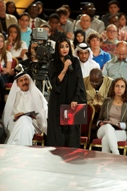 AUDIENCE (F)
AUDIENCE (F)
From Qatar. For those against, first of all, don't you think it's too late to just give up at this stage? Because, I mean, a generation who was able to create a protest of millions through a Facebook page will not allow such a thing to continue, especially after all those people that died already. We've all seen, for example, the army working hand in hand with the people in Egypt and other countries in this protest. I mean, yes, again, don't you think it's too late?
JANE KINNINMONT
Absolutely. Absolutely. We are not suggesting that people should give up in their struggle for democracy and rights. Rather, we are trying to outline the type of forces that will be trying to counter those moves.
TIM SEBASTIAN
But she has a point, that this is the first Facebook revolution. This is what's underlying her question.
AHMED ALI AL-MUKHAINI
Yeah, that's true. But then, you see, Facebook is not sufficient to actually do things that happen in government. You have to realise - I mean, not you, I mean everybody has to realise what happened in Egypt: you know, people in the Gulf and other Arab countries have learnt from. You know, as the protesters learn, governments also learn and they know how to handle. They actually diffuse and they pre-empt all their movement. We are not against people, we are not against people's rights, but we are saying you cannot dream. You have to be very practically orientated if you want to affect change.
TIM SEBASTIAN
I'd like to go back to the questioner and ask why you think the revolutions are unstoppable. You clearly do.
AUDIENCE (F)
I think we cannot compare. I mean, Miss. Jane gave an example of Saddam Hussein being in power for twenty years without anyone doing anything about it. But it's not the same today. The technology, the youth, the new generation, the power that's mixing with all the countries - it's not going to work. I mean, we all know Gaddafi and all other leaders are momentarily going to leave soon. It's impossible for them to stay for twenty years. And again, my question is: isn't it too late? I mean, it's too late now to just believe that it's not going to work.
AHMED ALI AL-MUKHAINI
I don't think it's too late. I think governments would still continue working at it, they will still... As I said, they will curb the momentum. What do they not want to happen? They do not want the momentum to build up, to reach a critical mass to affect change. They know it's going to happen twenty years from now, but they want to buy time. They are curbing the momentum. They are cutting. And they are. Because they have the money. And as I said, you know, you cannot rely on the European Union or the US or the Western powers.
TIM SEBASTIAN
Well, one moment you're saying they have their backs to the wall and they're like animals, then you're having them survive twenty years. Which?
AHMED ALI AL-MUKHAINI
Yeah, they can. Sorry. I think the Gulf countries can survive. And the Gulf countries would make sure that the other Arab countries whose interests are very much deep-rooted with them will continue. I mean, there you have just seen that they are heavily investing in Egypt. The 40 billion dollar promised by the G8, a quarter of which will come from the Gulf countries.
TIM SEBASTIAN
Anouar Boukhars, do you want to come in here?
ANOUAR BOUKHARS
Well, you're absolutely right. I mean, for the resistance, as I said...
AHMED ALI AL-MUKHAINI
Thank you. [Laughs]
ANOUAR BOUKHARS
No, it was expected. I mean, look, the Tunisian leader Ben Ali, did not choose not to use force! It's his military, right, that did not obey the orders. Same thing in Egypt. It's not that Mubarak did not order his military force to use force. It's his military forces that did not use force. So the GCC or others, they are not just inventing a new model. Look, two things. This wave of protests are about two things. You're right, there are the riches and then there is the political legitimacy. You can buy some time with what we call the "rentier effect" by buying people off. But even in the GCC there are troubles. Saudi Arabia cannot fund other countries, Morocco and elsewhere. It has its own problems.
AHMED ALI AL-MUKHAINI
They have [inaudible] of a hundred and fifty billion.
ANOUAR BOUKHARS
Unemployment in Saudi Arabia is 40 percent. The youth bulge is over 40 percent. Now, how can you say that..
AHMED ALI AL-MUKHAINI
[Inaudible] hundred thousand.
TIM SEBASTIAN
Let me come back to the questioner here. Excuse me. I just want to come back to the questioner here and ask her how far you think that revolutions in this part of the world, in this region, in the Gulf region, can actually go?
AUDIENCE (F)
We cannot compare the Gulf region to everyone else, first of all.
TIM SEBASTIAN
No, I'm not asking you to compare, but how far do you think they can go here? AUDIENCE (F)
AUDIENCE (F)
I don't think there's need for any, you know, protests compared to other parts of the Arab world. I mean, for me, democracy is, in this time of the world, is a fancy thing that everyone wants to go under. Although in reality it's not that great.
TIM SEBASTIAN
I'm sorry, I didn't understand that.
AUDIENCE (F)
I mean, if we talk about the Gulf not being happy with dictatorship, for example. One day, you believe, that people will protest in the Gulf against dictatorship. I don't see that happening, because everyone in the Gulf is, or mostly, are happy. And if we're going to talk about...
TIM SEBASTIAN
Happy with what - dictatorship?
AUDIENCE (F)
No, it's not dictatorship - that's what I mean. I mean, if we say democracy, for me it's a fancy title really. We have here freedom of speech more than anyone else, and we have all our rights in terms of... I mean, as a Qatari I can speak that we have more rights than we deserve. We don't pay for anything!
TIM SEBASTIAN
More rights than you deserve? I think some people might argue with you over that! [Laughter, applause]
JANE KINNINMONT
But if you look at the wider Gulf region, four out of the six GCC countries have seen protests this year.
AUDIENCE (F)
Yeah, but I mean, we cannot - why protest? I mean, in Bahrain, even Bahrain, if you go back to the history of Bahrain, these people that are protesting are people who got their passport from the Bahraini government. I mean, Bahrain did them a good - I mean, something in their favour of letting them be part of their country. And all of a sudden they're turning their...
JANE KINNINMONT
But I think you're just missing the main thing...
TIM SEBASTIAN
Excuse me, I want to bring Nadim Houry in. He's itching to have a word.
NADIM HOURY
Yeah. [Laughter]
TIM SEBASTIAN
I can't think why. But he's getting ready to.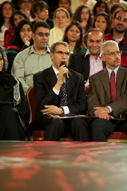 NADIM HOURY
NADIM HOURY
I don't know where to start. First of all, I mean, the Arab Spring is not just about revolution. The Arab Spring is about a transition of the Arab peoples from being subjects to being citizens.
ANOUAR BOUKHARS
That's right.
NADIM HOURY
Okay, and if we accept that premise, then you can have multiple models in the region coexisting. And it's great that you feel that you can go and ask from your government. Your government never gives you more than you deserve. You deserve this and more. You know. And it's the same in Bahrain, [Applause] you know. I mean, this is, I think, sort of at the heart of what's happening in the Arab Spring. No one is saying every country is going to go get rid of its dictator. I'm Lebanese - we'll actually have to get rid of 17 dictators in Lebanon of each community. [Laughter, applause] You know, I mean, but what we are saying is what we are witnessing today is history shifting. And if we stay quiet for a second we can hear it. I mean, look at us - we're all optimists. Six months ago, probably all of us would have been pessimists. And just think of that - think of that for a second. Deep down you feel change is coming. And the other side, when I hear them, you know what I remember? I remember conversations I had in Egypt after Tunisia, because you are right - Tunisians showed us the way. And after Tunisia Egyptians would say, "But it's different here. We're geo-strategic. We're too big a player, too big to fail." And then Egypt fell. And then President Bashar al-Assad got on the Wall Street Journal and said, "Syria is different, because the people love me." And it's the same - we hear it the same. They will change. They will change.
AHMED ALI AL-MUKHAINI
It is not that we are too good to fail.
TIM SEBASTIAN
Okay, let him come back.
AHMED ALI AL-MUKHAINI
It is not that we are too good to fail. I'm not saying that the Gulf [inaudible].
NADIM HOURY
Not too good - too big to fail.
AHMED ALI AL-MUKHAINI
We are not too big to fail. We are not saying that. We're just saying they have the tools. They have what it needs to make them succeed. They will succeed. They will make this Arab Spring futile.
TIM SEBASTIAN
Okay. What I want to do here is just take a little sample of opinion from some people in the audience. I just want a sentence from various people, if you'll put your hand up - we'll get a microphone to you - to answer the question that our questioner here raised, which was basically saying: "We've got enough rights here. Why protest? We have all the freedoms that we need." And I want to know whether that view is echoed by other people in the audience. So if you'd put up your hand, we'll get a microphone to you. And if you just have a sentence to say about that. I don't see a lot of hands going up. Are people unwilling to speak about that?
ANOUAR BOUKHARS
There are no Mukhabarat here. [Laughter]
TIM SEBASTIAN
Yes! Just a sentence, really, just a brief view.
AUDIENCE (M)
I think someone's rights are different from someone else's rights.
ANOUAR BOUKHARS
Mmm, interesting.
AUDIENCE (M)
Someone's rights are not necessarily the same as someone else's rights. You know, the rights of a Moroccan are not necessarily the same.
TIM SEBASTIAN
Where are you from?
AUDIENCE (M)
I'm from Morocco, as it happens.
TIM SEBASTIAN
You don't feel you have enough rights, do you?
AUDIENCE (M)
Well, I'm looking at things rather unmaterialistic. I'm more interested in having, you know, things such as freedom of expression, the freedom to choose, the freedom to decide my future.
TIM SEBASTIAN
What's what you'd like to have?
AUDIENCE (M)
Absolutely.
TIM SEBASTIAN
Okay, is that view echoed by anybody? I'm going to go to the gentleman over there. You have a comment, a very brief comment on whether people in the Gulf have all the rights that they need, as our questioner suggested here?
AUDIENCE (M)
Well, I quite agree with her, because she's a Qatari and she feels that way. In terms of that she has essential needs, that maybe it's a fancy thing to ask for. That's the opinion. I think there is such an opinion here in Qatar which I hear from my colleagues and my friends. I might not agree with them necessarily, but that's how they see it.
TIM SEBASTIAN
Okay. Anybody else have a view? There's a gentleman there in the fourth row. AUDIENCE (M)
AUDIENCE (M)
Hello, I'm from Qatar. I just want to say why do people look for countries above us? Why don't you look for countries below us? That's why she's right. We have rights more than our rights. Why don't we look at countries below us?
TIM SEBASTIAN
You have all the rights that you want?
AUDIENCE (M)
Yes.
TIM SEBASTIAN
And all the rights that you need. Anybody else?
AHMED ALI AL-MUKHAINI
Can I have an example of a country that's below us?
TIM SEBASTIAN
Below them, you mean?
AHMED ALI AL-MUKHAINI
Oh yeah, okay, below them. Give me an example of a country that you think is below Qatar, for example.
AUDIENCE (M)
You have in Asia and Africa. There are many countries below us. I mean, for example, in Qatar we have free..
TIM SEBASTIAN
Below you in what way?
NADIM HOURY
In what sense? Yeah.
AUDIENCE (M)
I mean like in Qatar we have free education and free medical services. In the US you know there is huge conflict between the health insurance. And in Qatar we have it for free. So I think she's right. Why do we look for countries above us? Why don't we look at countries below us?
TIM SEBASTIAN
Okay, anybody else want to make a brief point about the subject that we're discussing? There's a hand up there. If you'd stand up, we'll get a microphone to you.
AUDIENCE (F)
Of course, if she's comparing herself to other countries such as Saudi Arabia, she has more rights, of course. But if you're comparing yourself to other countries, you have the rights you deserve. You do have the right to a free health insurance, you do have the right to have all the things you need. This is not more than you should get.
TIM SEBASTIAN
Okay. Anybody else want to make a quick point? There's somebody else at the back. If you'd stand up, we'll get a microphone to you.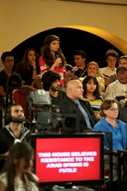 AUDIENCE (F)
AUDIENCE (F)
Well, all of you here, we've just been talking about the problems in Egypt and in all of the other places in the world. And about Qatar specifically, you can see that everyone here has, like students have education that is higher than most places in the GCC. We have a high economy. We have good medical care. Honestly, looking at every single other place in the GCC, can you say that Qatar doesn't really have the best kind of life for the citizens here? We have all the freedom we can get. We have all the things. And if we don't, then why hasn't anyone already protested? [Applause]
NADIM HOURY
Can we make a quick point here?
TIM SEBASTIAN
Yes, please. I'd like you to come in.
NADIM HOURY
I agree, and I don't think it's a... You know, you're lucky that you were born in Qatar or that you were born in the GCC. You know, you're born with a big virtual sum in the bank, because your country is very rich in natural resources. But what is the percentage of people who work in Qatar, who work in Saudi, who work in the UAE, who were not born in these countries, and do they benefit from the free healthcare, do they benefit from all these rights? You know, again, it's not a question of sort of comparing down or up. Obviously, the GCC, or what my colleagues call the "rentier effect" - you know, the fact that there is a lot of wealth is important. And no one here is sort of criticising or not criticising Qatar. But even in wealthy countries... You know, Tunisia, the country that started the revolution, was considered to be a successful model of non-rentier states, right. It was the model that other Arab countries that don't have oil aspire to, right. Because they had a good education system, they had a relatively good...
TIM SEBASTIAN
Are you struck by the level of contentment? Are you surprised by the level of contentment here?
NADIM HOURY
No, look, it's not... No, no, I'm not surprised.
TIM SEBASTIAN
[Turning to those against the motion] Are you?
AHMED ALI AL-MUKHAINI
No. I'm not struck.
NADIM HOURY
Because it's not... Look, if you were having this debate in another country, it would be different. It doesn't strike me. What I'm trying to think is - there are two things at play here, I think, that are key in the Arab Spring. Yes, in many countries there was the sort of desire for more social equality. And if you are born in a rich country like Qatar, that is not going to be a challenge. But there is something else very important at play in the Arab Spring and that is the aspiration for freedoms and lack of discrimination.
TIM SEBASTIAN
Okay, I'm going to let the questioner have a final word on this issue, and then we're going to move on to...
AHMED ALI AL-MUKHAINI
Just can I say to one thing he said?
TIM SEBASTIAN
Okay, very briefly.
AHMED ALI AL-MUKHAINI
Very briefly. You see, that's why Gulf countries are going to fund all these aspirations. They will not make them feel that there are social injustices or economic disparities. They would fund it. They have the money, they will do it.
NADIM HOURY
Why haven't they before if they have the means to do it?
ANOUAR BOUKHARS
Not all of them will.
AHMED ALI AL-MUKHAINI
No, they will make it. They will make it.
TIM SEBASTIAN
Okay, I'm just going to take a comment from the original questioner on this issue. Can we get a microphone to you? I'm going to allow you one brief comment at the end of this.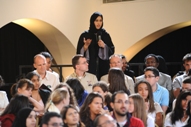 AUDIENCE (F)
AUDIENCE (F)
Just one very brief comment. I think we don't thank God we're Qatari because we have a big amount in the bank or because of the petrol. A lot of other countries do have a lot of money. It's how our leaders invest in us, that's what we're proud of. And that's why we won't protest. The education they provide us, I mean, Education City, Aspire, the medical care - these are things that are not because they have money. A lot of other countries have money. That's because they care about their people, they care about how we will turn out in the end. And that's my point. Thank you. [Applause]
TIM SEBASTIAN
Okay, we're going to move on and take some questions from elsewhere now. A gentleman in the fifth, sixth row there. If you'd stand up, we'll get a microphone to you.
AUDIENCE (M)
Hi, I'm from the United States. And what I'm wondering about is the ancient regimes of Europe fell to philosophies that were created in the 16th century and 17th century, and they fell a couple of hundred years later. What, if any, is the philosophy guiding these revolutions - is there one and how is it going to play into how things move in the future? Thank you.
TIM SEBASTIAN
Anouar Boukhars. Philosophy.
ANOUAR BOUKHARS
Sure, yeah. The philosophy is political legitimacy and authority. And here I can understand where you're coming from. I mean, if that's the perception of the leadership, that it is efficient, effective and delivers what the people aspire to, then that's fine. I mean, whether it's a democracy or not, that's a second question. But it is about political legitimacy, it is about dignity. That's a good comparison to the monarchies in Europe, because we can draw an analogy. 1848, for example, the German monarchy and the Italian monarchy, for example, they were smart enough for the time in which they ran ahead of the protests and they survived by delegating more constitutional powers to parliament, right.
TIM SEBASTIAN
But they're very divided the revolutionaries at the moment, aren't they. I mean, you've got, what, seventy political parties in Tunisia at the moment?
ANOUAR BOUKHARS
Well, that's exactly - I mean, that's to be expected. That's to be expected. That power has...
TIM SEBASTIAN
It's not exactly helping their cause, is it?
ANOUAR BOUKHARS
What cause?
TIM SEBASTIAN
Reforms. A different way of life. Change.
ANOUAR BOUKHARS
Well, that is helping. Of course it is.
TIM SEBASTIAN
It's chaos, isn't it?
ANOUAR BOUKHARS
No, it's not chaos! I mean, the same thing happened in Indonesia - and I hate to keep drawing these analogies.
AHMED ALI AL-MUKHAINI
It's not going to happen..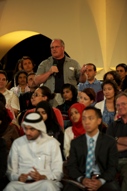 ANOUAR BOUKHARS
ANOUAR BOUKHARS
I mean, that's healthy. We expect resistance from the old guard, from hardliners. We will see divisions. We will see debates.
TIM SEBASTIAN
Okay, let Ahmed Ali al-Mukhaini speak.
AHMED ALI AL-MUKHAINI
Well, this very statement says to me that you are agreeing that whatever the government, resistance is not futile - it will happen, okay. It will actually bear fruit. And your use of the historical narrative is suggesting that Arab countries would have to go through the same cycle of evolution. And you are assuming that the democratic model of philosophy as the gentleman has mentioned would be endorsed. Well, I see that these models, these philosophies, these principles, are not totally ignored.
ANOUAR BOUKHARS
No, those two monarchies survived while others...
TIM SEBASTIAN
Okay, I don't want to get too bogged down in history here. Just make one point.
ANOUAR BOUKHARS
Just quickly, if you don't mind. I need to make this point. Those two monarchies survived while others didn't, because they opened up their political system. Those that did not open up their political system were swept away. But even those that did, they just bought some time.
TIM SEBASTIAN
Okay, all right. There was a gentleman in the second row.
NADIM HOURY
Can we just clarify this one point?
TIM SEBASTIAN
I don't want to stay with history, really.
NADIM HOURY
No, because it's not about ideology, what's going on right now, you know. What people want... I mean, it's natural to have seventy parties today in Tunisia. Because, you know what, you couldn't discuss politics, let alone political ideology, for a very long time. So it's normal. I mean, thankfully it's not an ideologically-driven revolution, because ideologically-driven revolutions get us straight into the wall. These are revolutions about having space to express themselves.
TIM SEBASTIAN
Okay, all right. You've made your point. The gentleman there has a question.
AUDIENCE (M)
I find it difficult to understand the argument of the opposition of the motion, because basically any debate, any discussion about the Arab Spring should keep in mind that this is a process. It will take time, of course. And obviously this kind of change will not happen if people sit at home. Basically they need to move. This movement will lead to people demonstrate, you may see clashes on the street, people may be killed. This is the nature of the revolution. So basically you cannot say that there is no hope for this. Because basically...
AHMED ALI AL-MUKHAINI
No, we're not..
TIM SEBASTIAN
He didn't say that.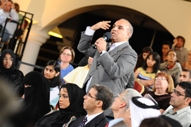 AUDIENCE (M)
AUDIENCE (M)
Let me finish. Because basically you are speaking about democratisation or changing. A,B,C change is actually the people demonstrating. People go outside, people express their ideas. So basically in the nature of your discourse there is a problem of the definition...
AHMED ALI AL-MUKHAINI
The timeframe suggested here is...
AUDIENCE (M)
Is there not a contradiction as well? You cannot speak about democratisation without people's demonstration and express their ideas.
TIM SEBASTIAN
Okay, Jane Kinninmont.
JANE KINNINMONT
I think you're misunderstanding our argument. We are not saying that there is no hope for change or that setbacks mean that there will never be democracy. What we're saying is that the resistance forces do have a lot of tricks up their sleeves, they want to survive, they want to maintain power, and they will have some successes. Even if they're not victorious in the long run - there's a great quote from the economist John Maynard Keynes, which is: "In the long run we are all dead." If I'm a dictator fighting for survival, this five years is worth it for me.
TIM SEBASTIAN
Okay, let me come back to you. Let me come back to you.
AUDIENCE (M)
This happened in 1979. Iran under the Shah, he resisted, resisted, resisted and at the end of the day he left. So, of course. But at the end of the day, people won the battle and regardless of your opinion of the regime.
AHMED ALI AL-MUKHAINI
They had a structure. They had funding. That's different. One's different...
JANE KINNINMONT
But you need to listen to the wording of the motion.
TIM SEBASTIAN
Ahmed, nobody can hear if you talk at the same time.
JANE KINNINMONT
The wording of the motion is not "resistance is ultimately doomed in the long term"; the wording of the motion is "resistance is futile". And it's not entirely futile. Regimes are able to buy themselves time. That matters to them, and they will fight for it.
TIM SEBASTIAN
Okay, I'm going to take a question from the lady in the third row. Yes, you. If you'd stand up and tell us where you're from, please.
AUDIENCE (F)
I'm from Libya. And I want to ask the opposition how they can, I mean, they mentioned that, you know, the uprisings are chaotic and whatnot. I just wanted to bring into light that Libya has been ruled with an iron fist by a dictator named Muammar al-Gaddafi for 42 years. Weeks into the revolution, when the people rose peacefully against Gaddafi and were met by guns and violence, they were able to form a National Transitional Council that is now, even though Gaddafi is still trying to hold onto power, this Council has been recognised by many nations in the world and has formed many diplomatic relations. So I mean, to a Libyan and to somebody who is seeing events unfold all over the region, I don't think that it makes any sense to say that the dictators can resist. Because if there was an example of a hopeless situation... TIM SEBASTIAN
TIM SEBASTIAN
Gaddafi is resisting, isn't he? Gaddafi is resisting somewhat?
AUDIENCE (F)
He's resisting, but he's definitely losing power. And I mean, I think that the world...
TIM SEBASTIAN
How long do you give him?
AUDIENCE (F)
How long do I give him? Well, I hope tonight, but I'm not sure. [Laughter, applause]
TIM SEBASTIAN
Jane Kinninmont.
JANE KINNINMONT
I agree with you. Every country is different, though. And I think in Yemen and maybe in Libya it is a matter of a very short-term amount of time for these rulers. But that's not the case looking across the whole region.
AUDIENCE (F)
I just want to say that, okay, it's not the case across all regions, but I wanted to point out that the situation in Libya was, I think, probably one of the most, I mean, the oppression that was happening in the country for 42 years. So if the Libyan people can do it and we are not a large nation; we are no more than seven million people, and we are being met by violence up until today, you know and they are doing it, and they are arising. So it is futile to, I think, resist that.
TIM SEBASTIAN
Okay. Ahmed Ali al-Mukhaini.
AHMED ALI AL-MUKHAINI
I'd like to ask you: how do you think they actually - why is this different? Why they managed to do it if they were under forty years of political starvation as I called it? Why and how they managed to do it?
AUDIENCE (F)
Why did they do it? Because...
AHMED ALI AL-MUKHAINI
No, how they managed to succeed, if we assume that they have succeeded.
AUDIENCE (F)
Because enough is enough.
AHMED ALI AL-MUKHAINI
No.
AUDIENCE (F)
I mean, they decided that this was going to be the time when they arise and they don't go down.
AHMED ALI AL-MUKHAINI
No.
AUDIENCE (F)
I mean, you know, there have been attempts before that were not successful.
AHMED ALI AL-MUKHAINI
No. Don't you think that if it wasn't for the European Union and the States giving them legitimacy, they would not have moved? It was not on their own accord. It was not on their own efforts.
AUDIENCE (F)
I think that the steps that the leaders in the National Transitional Council of Libya took are what made the rest of the world recognise them as a legitimate body to govern or to help transition Libya into a new phase. The West did help us. Without NATO, I mean...
AHMED ALI AL-MUKHAINI
No. I'm sorry to disagree.
AUDIENCE (F)
... more lives would have been lost. But I think that the initiative that the Libyan people took cannot be understated. And that's what made it. [Applause]
AHMED ALI AL-MUKHAINI
I'm sorry to disagree.
TIM SEBASTIAN
Okay, okay, just a very...
NADIM HOURY
Can I just jump in here? No, but it's very hypocritical...
TIM SEBASTIAN
Nadim Houry.
NADIM HOURY
It is very hypocritical for the other side to somehow use international support for protesters to take away their legitimacy. Without international support, without Western support half of the autocracies in this region would not have seen the light of day thirty years ago. [Applause] So let's not use that way.
AHMED ALI AL-MUKHAINI
Exactly.
NADIM HOURY
The West has supported autocratic regimes for a very long time and it is because people took to the streets, you know, they forced change. They didn't just force change on their own. You know, if protesters now are being respected by the G8 or they're being respected in Paris or in Washington or in London, it's not because suddenly the Westerners have become nicer; it's because people took notice of people on the streets. [Applause]
AHMED ALI AL-MUKHAINI
No.
NADIM HOURY
So let's show those protesters the respect they deserve. And yes, I am glad that in some cases after the French had sold aeroplanes to Gaddafi they woke up and used other aeroplanes to bomb him. It was a mistake the first time around, and I'm glad they fixed that mistake. And good for them that they managed to get that support.
JANE KINNINMONT
But it's not an attempt to de-legitimise, but it's looking at another factor that will be important. Let's assume that the West is not suddenly supporting democracy all across the region. If people in, say, Saudi Arabia and Syria don't have international support, then the resistance that their governments are putting in place is going to be all the more effective, because it will have Western backing. They will be able to access weapons, they will be able to access funds, etc.
TIM SEBASTIAN
But there is a considerable level of Western support now.
AHMED ALI AL-MUKHAINI
Doubt it.
JANE KINNINMONT
It's not about the ethics of that Western support; it's about the fact that that is still a factor. And for some governments that international support is still in their favour and not in the favour of the people on the streets.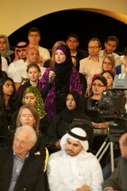 TIM SEBASTIAN
TIM SEBASTIAN
Okay, a lady up there, you have a question.
AUDIENCE (F)
My question is to the opposition.
TIM SEBASTIAN
Where are you from, please?
AUDIENCE (F)
I'm originally Palestinian, but I lived in Jordan. So for the example in Jordan, the basic ministers were actually taken down because of the corrupt that was available. And there were people who were killed in downtown who were calling for their freedom, who were calling for a little bit more money for them to be paid. When you have a good percentage of your country being paid lower than the minimum wage in the West, it's kind of ridiculous to keep looking at whether the West is going to be supporting these people. Because honestly, these people aren't sitting there thinking, "Well, am I going to be supported by the West or not?"
TIM SEBASTIAN
So what is your point about the revolutions?
AUDIENCE (F)
My point is: what are a thousand or two thousand lives if they are fighting for their freedom, if they're fighting for a better life? What are they? The French, during the French Revolution, as the gentleman said, they were killed in mass numbers. It was by their sheer numbers that they overthrew the aristocrats and beheaded them.
TIM SEBASTIAN
So where do you put your money: do you put your money on the revolutionaries or on the governments being able to resist them?
AUDIENCE (F)
The revolutionaries. Because it's by sheer numbers and by sheer potential of the people. There are way too many people in the countries, in different countries. Every country is different. There's no doubt about that. But we can't underestimate the potential of every single citizen there. Now, we're talking about...
TIM SEBASTIAN
Okay, I just want to get a reaction. Do you think she's wrong?
AHMED ALI AL-MUKHAINI
No, if you are willing to sacrifice millions and millions of lives of people, that's fine. But then you have to work on reconciliating all of these lives and reconciliating the schisms you are creating with a society. But it's going to take lots of money, lots of blood.
AUDIENCE (F)
I assure you, I think if there are enough people being oppressed and silence is something that has been used against us forever.
AHMED ALI AL-MUKHAINI
If they are given money. You know, if the Gulf countries go to Jordan, give Jordan billions of dollars, they actually give them job opportunities - they pay for them to be quiet - then the Jordan case is closed.
AUDIENCE (F)
Well, why be dependent on the Gulf countries?
AHMED ALI AL-MUKHAINI
Oh, they will. Why not?
TIM SEBASTIAN
But his point: do you believe that they can be bought off, the demonstrators, the revolutionaries?
AUDIENCE (F)
Well, honestly, if you're... the demonstrators themselves? Well, what happens if the Gulf countries, I don't know, their petrol runs out? In the far run, all right, what if the petrol... I mean, if we're going to keep depending on other countries buying us out of our freedom, then what's left? We're talking about sheer potential. It's sheer willpower.
AHMED ALI AL-MUKHAINI
That's for the future. The present will come to it.
TIM SEBASTIAN
Okay, all right, a very brief comment.
ANOUAR BOUKHARS
I think you're misdiagnosing the problem. These revolutions are not just about economic grievances or about religion or about foreign interference, and I keep going back to it's about authority. So you might raise the subjects, like what happened in Morocco and elsewhere, you know, you might raise wages and all that, but that's not going to stop people from rising up. Because you're not addressing the main concern. That's why in Morocco, for example - and you're right, there's going to be different trajectories. Morocco at first, you know, when the people took to the streets on February 20th, the monarch came and called a demagoguery and he created a council for social and economic reforms, but then on March 9th he came up and he granted decent political reforms. Why? Because he understood that what people are asking for right now are political rights, civil rights and it's not just about economic rights. That's only one part. TIM SEBASTIAN
TIM SEBASTIAN
Okay, I'm going to take a question for this side of the panel, those who are for the motion. Can we have a question for this side? Who has a question for this side?
AUDIENCE (M)
My question is for Mr...?
NADIM HOURY
Houry. Nadim Houry.
AUDIENCE (M)
Houry, yes. Sorry. Houry. Okay, you said ...
TIM SEBASTIAN
Where are you from?
AUDIENCE (M)
I'm from Syria. You said that we lived in this region for forty years or fifty years in rotten politics as you mentioned. Okay. Now, nobody touched on the outside factors of the rotten politics as you mentioned, as you named it. For forty years or for half a century the region has been sleeping because of the, let's say, conspiracies of the Western politics into this region, all right. Nobody has mentioned, from the House, Israel or the struggle between the Arabs and Israel. That's an important cause of this situation.
TIM SEBASTIAN
Okay, well, we're talking about something else.
AUDIENCE (M)
Well, I see this as a factor of this operation that the regime has been doing on the people, all right? This is something important. And I believe that the Western politics has come now to this region to introduce democracy. Now, why now, all right? Where the Western countries have been in the last fifty years?
TIM SEBASTIAN
Anouar Boukhars, why now? Why is the West promoting democracy now?
ANOUAR BOUKHARS
Well, the West - I mean, again to go back to your point, the West has not promoted them in democracy. I mean, it's the people who put it on the agenda. Remember with the Obama administration or others, they came late in the game. I mean, we all followed them in what happened in Tunisia and the same thing in Egypt. It's just when they realised that Mubarak does not stand a chance. Same thing in Yemen. The Obama administration stayed with Saleh until very recently when the people in the street demonstrated that they would not settle for anything less. So you're right: I mean, there is the Israel aspect of it, there is foreign agenda. These play a contributory role, but not the main role. The people are asking, you're right, for dignity, and for their rising against humiliation. And there is a foreign aspect of it. Look at Egypt, for example. I mean, it has been in a sorry state in the last thirty years. I mean, compared to the Nasser air, for example, despite the '67 war, the defeats and others, at least he stood for something. Mubarak did not stand for anything, so he did contribute to why people rose up. Because you feel that you are humiliated outside.
TIM SEBASTIAN (to questioner)
Okay, do you want to come back on that? No, let him come back. Let him come back.
AUDIENCE (M)
Yeah. You're telling me that now there is some unrest in the people and that people want a change, all right. Now, we all agree that the demands of the people are really agreeable, we agree on these demands. Now, my question is that the West has supported these regimes a for long time. Now they want the change. Why they didn't give us help, give these regimes help to make these reforms? President al-Assad has announced plenty of reforms in the last ten years, but outside conspiracies, starting from the US invasion of Iraq and the Lebanon crisis and Israel, they've put some obstacles on that.
TIM SEBASTIAN
Okay. Nadim Houry, do you want to just comment on that briefly?
NADIM HOURY
Of course. This is not about conspiracies. What I like about this Arab Spring is that for the first time in a long time we're not blaming Sykes-Picot, we're not blaming the Israelis, we're not blaming anyone else. This is about us. It doesn't mean, no one is going to give any country a favour. You have to take your rights with your own hands. And for a very long time foreign conspiracies, some of them are true, but foreign plots were always used to defer reforms. Syria was a typical example. I mean, I'm sorry, President Bashar al-Assad has had an excellent relationship with the West since 2007. What happened to all the promises of reforms he did in 2005 during the second Baath Party? What happened to the promise of reforms in 2007? The truth is it wasn't the West preventing President Bashar al-Assad of doing it, it wasn't Israel and it wasn't little Lebanon who was preventing it from doing it. The truth is..
TIM SEBASTIAN
Okay. Just make this point and then I need to move on.
NADIM HOURY
No, but I think it's very important. It is important to go back. This is about domestic grievances. Let's stop blaming the others for our mistakes. Because blaming the others for our mistakes after forty years got us nowhere. [Applause]
TIM SEBASTIAN
Okay, all right. I'm sorry. I'm going to take another question. The lady in the fifth row, please.
AUDIENCE (F)
I have a question for the opposition. So I'm Syrian and I represent the youth of my country. And you said before that the ruler can buy everybody and change the rules of the game. But how can legitimacy be bought?
AHMED ALI AL-MUKHAINI
Assuming that they are concerned about legitimacy. I mean, you are assuming that they are concerned about legitimacy. It has been portrayed that these people are suffering from social injustices and economic disparities. If their economic disparities are sorted out, then you can leave this legitimacy issue to a later stage. Curb the momentum, give them what they need and eventually you can work out how they can actually be involved in politics.
AUDIENCE (F)
But it isn't legitimacy, it is economic credence. But will people have the right to do what they want?
AHMED ALI AL-MUKHAINI
Eventually.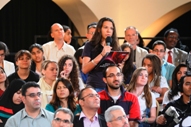 AUDIENCE (F)
AUDIENCE (F)
Do we have the right to vote?
AHMED ALI AL-MUKHAINI
Eventually. In donkey's years time, perhaps.
JANE KINNINMONT
We've mentioned a number of factors that governments will use. In Syria, the government simply does not have the economic resources to buy off the populations. That is an argument that is more powerful in the Gulf States. In Syria, I think, they will be using more ideological arguments - arguments that the opposition is backed by foreigners, arguments that pressure on the regime will weaken the opposition to Israel in the region and things like this. And this propaganda and these narratives are quite powerful. One of the most interesting, although I must say, slightly shocking things that I've heard in the room this evening is this assertion that all the protesters in Bahrain were not born in Bahrain. This is a myth. But it's interesting that it's something that you believe, because it does show the power of that propaganda that's being presented to suggest those protesters are disloyal, they're not real people.
TIM SEBASTIAN
Okay, all right, I just want to go back to the questioner briefly and ask her to what extent do you think the protests inside Syria will be successful, will bring about either reforms or a change of regime?
AUDIENCE (F)
We don't know how it will happen. Nobody thought that in Egypt or in Tunisia there were the people who won. But it may be good and may be wrong, but there will be changes. And perhaps it will be in favour of the people.
TIM SEBASTIAN
So you're betting on the revolutionaries, you're betting on the reformists rather than the government?
AUDIENCE (F)
Yes.
AHMED ALI AL-MUKHAINI
I must say one tiny thing here, that I think the issue of legitimacy, I think the issue of political demands is really taken out of proportion. I think it's more to do with socio-economic and disparities around that line. The political thing will come at a later stage.
TIM SEBASTIAN
Okay, all right. We're going to vote on the motion in a moment, but before we do that I want to just go round each of the panellists in the semi-circle and ask them for a sentence to sum up their views before you do get to vote. So if I could start with you, Anouar Boukhars. Very briefly, a sentence.
ANOUAR BOUKHARS
Sure. The thrust of today's wave of protests is less about economic grievances, it's less about identity, but it's more about political legitimacy. That's what it's all about.
TIM SEBASTIAN
Nadim Houry.
NADIM HOURY
The wall of fear has been broken in the region, and a new generation, a younger generation has made its arrival to the political scene. The genie's out of the bottle. It's not going to be an easy ride. Not all countries are going to follow the same path. But change has come. And whoever tries to resist that change is fooling themselves and preparing themselves to go to the Hague to be tried. [Applause]
TIM SEBASTIAN
Okay. Ahmed Ali al-Mukhaini.
AHMED ALI AL-MUKHAINI
For the time being, resistance to the Arab Spring is not futile; it will bear fruit, because they have the authority, they have the money, they have the power, and they will make it happen. You will see lots of loss of lives.
TIM SEBASTIAN
Jane Kinninmont.
JANE KINNINMONT
I'll just remind you this is not a vote on whether you support the Arab Spring. It's a vote on whether the resistance is futile or whether the resistance can be effected. I think the democracy activists have to believe that they'll win if they're ever going to be successful, but they also have to recognise how powerful the forces against them are, in order to tackle them. Thank you.
Vote result
TIM SEBASTIAN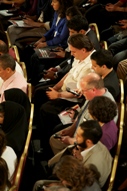 Okay, all right. Ladies and gentlemen, we're going to vote now on the motion: "This House believes resistance to the Arab Spring is futile". Would you just take your voting machines. Let me just explain to you how they work. If you want to vote for the motion - that is the side represented by those on my right - you're going to need to press Button 1. If you want to vote against the motion - the side represented by those on my left - it's Button 2. Whichever button you want to press, would you please press it now. You only have to press it once. Through the miracles of modern science, your vote will be transmitted to the computers and we should have it for you in just over twenty seconds' time.
Okay, all right. Ladies and gentlemen, we're going to vote now on the motion: "This House believes resistance to the Arab Spring is futile". Would you just take your voting machines. Let me just explain to you how they work. If you want to vote for the motion - that is the side represented by those on my right - you're going to need to press Button 1. If you want to vote against the motion - the side represented by those on my left - it's Button 2. Whichever button you want to press, would you please press it now. You only have to press it once. Through the miracles of modern science, your vote will be transmitted to the computers and we should have it for you in just over twenty seconds' time.
All right, there we have it. 73 percent for the motion, 27 percent against. The motion has been resoundingly carried. [Applause]
JANE KINNINMONT
Congratulations.
AHMED ALI AL-MUKHAINI
Well done!
NADIM HOURY
They had a tough side.
AHMED ALI AL-MUKHAINI
It was an easy task. [They laugh]
TIM SEBASTIAN
All that remains for me to do is to thank our distinguished panellists. Thank you very much for coming tonight. Thank you to you, the audience, for your questions. That's it from the Doha Debates team. Thanks very much for coming tonight. Thank you. Safe journey home. Goodnight. [Applause]
Watch online

